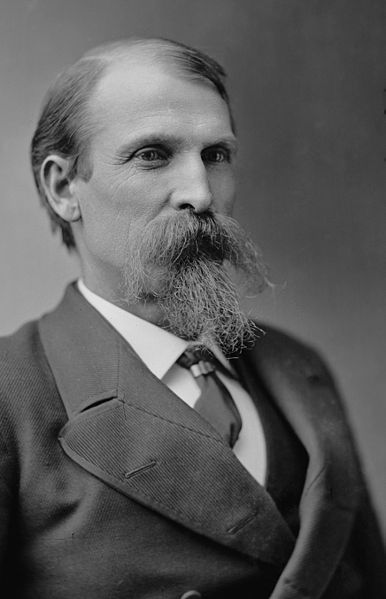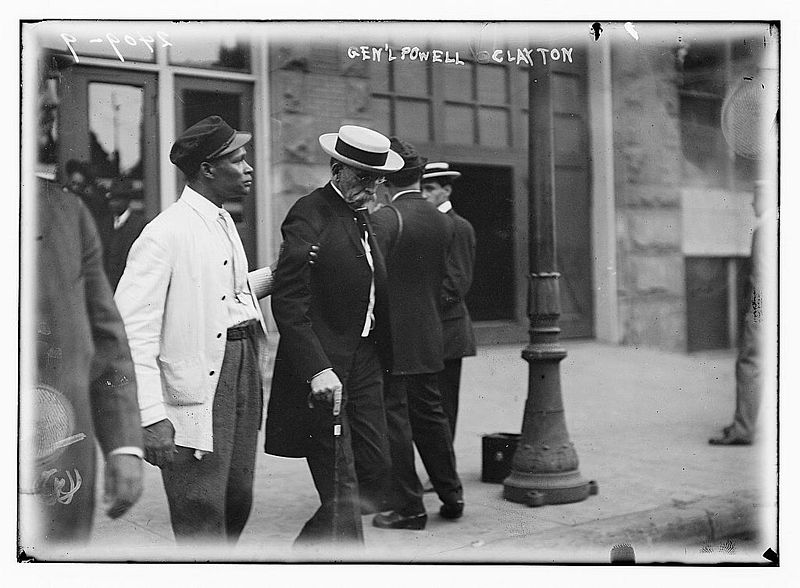<Back to Index>
- Geologist Auguste Michel - Lévy, 1844
- Painter Charles Henry Francis Turner, 1848
- 9th Governor or Arkansas Powell Clayton, 1833
PAGE SPONSOR


Powell Clayton (August 7, 1833 – August 25, 1914) was an engineer, a Union Army general in the American Civil War, the first Reconstruction Governor of the State of Arkansas, and Ambassador to Mexico during the administrations of William McKinley and Theodore Roosevelt.
Clayton was born in Bethel, Pennsylvania, to John and Ann Glover Clayton. He was a direct descendent of William Clayton, originally from Chichester, England, who was a close friend of George Fox, founder of the Quakers, and William Penn, founder of Pennsylvania. His father was an orchard keeper and carpenter and parents had ten children in all, although six died in infancy. He attended a private military academy in Bristol, Pennsylvania, and later attended engineering school at Wilmington, Delaware.
Clayton moved to Kansas in 1855 and served as an engineer at Leavenworth, Kansas. On April 29, 1861, he is recorded as having a company of militia at Fort Leavenworth. In May 1861 Clayton was formally mustered into the Union Army as a captain of the 1st Kansas Infantry. In December 1861, he was promoted to lieutenant colonel of the 5th Kansas Cavalry and later to colonel in March 1862. During the war he served primarily in Arkansas and Missouri and fought in several other battles in those states.
During the morning and early afternoon of October 25, 1863, Clayton was in
command of federal troops occupying Pine Bluff, Arkansas. He
successfully repulsed a three - pronged confederate attack of the forces
of General John S. Marmaduke.
Cotton bales hastily placed around the Pine Bluff courthouse and
surrounding streets provided an effective barricade for the union
defenders. Confederate loss was 41 killed, wounded, and captured.
Clayton was appointed a brigadier general of volunteers on August 1, 1864. Powell
decided to stay in Arkansas, possibly because of a woman he fell in
love with. He married Adaline McGraw of Helena and purchased a farm in
Jefferson County with his brother William (W.H.H. Clayton).
Arkansas was a violent place after the war with lynchings, murders and
intimidation. Powell was told by other farmers that they would pretend
to go along with reconstruction but would win back what they had lost
through peaceful means. Powell decided he would stay out of conflicts
and tend to his farm. When his neighbors became more and more
threatening, he decided to enter politics. In
1868 he was elected the first Republican governor of Arkansas. His
tenure was marked with soaring state debt (despite a state surplus when
he took office), corruption, and violence. He was forced to declare
martial law at the beginning of his term because of racial tensions.
Many members of his administration, and colleagues in his party were
brought up on corruption charges while he was governor. Clayton himself
was impeached at one point, but he was never formally convicted of a
crime. He was involved with the tampering of a US senate election
between Thomas Boles and John Edwards. However he was not convicted of
anything because of a technicality in election rules. He did work to
improve the infrastructure in Arkansas building railroads, levees, and
unifying the school system, however the means used to raise the money
for these projects was often controversial and probably led to the
state debt. On September 9, 1868 Clayton lost his left hand while hunting outside Little Rock when his rifle discharged. Powell
Clayton accepted election to the United States Senate reluctantly after
some controversy over who would become governor of Arkansas. Once he
was sure Arkansas was stable he left the state. His administration is
mainly blamed for the Brooks – Baxter War. While
in the Senate, he worked with President Grant and his brother W.H.H.
Clayton to redirect Judge Isaac Parker from Utah to Fort Smith. The
legendary “Hanging Judge” along with U.S. Attorney Clayton are credited
with bringing law and order to the region. W.H.H. Clayton was later
instrumental in bringing statehood to Oklahoma. Clayton returned to Arkansas and in 1882 established a home at the resort town of Eureka Springs, Arkansas, living in what is now the Crescent Cottage Inn. He
was President of the Eureka Springs Improvement Company (ESIC). This
group worked to improve Eureka Springs, building commercial and
residential structures, many which still exist. They also work to bring
the railroad to Eureka Springs. The ESIC also built the Crescent Hotel,
one of Eureka Springs most notable landmarks. A poem on the fireplace
in the lobby of the Crescent Hotel is attributed to Clayton. His brother, John Middleton Clayton was assassinated in 1889 in Plumerville, Arkansas, in Conway County while attempting to dispute the outcome of his Congressional race with Democrat Clifton R. Breckinridge. Powell Clayton was appointed as Ambassador to Mexico in 1897 by President William McKinley and served in that position until 1905. In 1912 he moved to Washington, D.C.. Clayton was the author of The Aftermath of the Civil War in Arkansas, published posthumously in 1915. Clayton died in Washington, D.C., and is buried at Arlington National Cemetery.